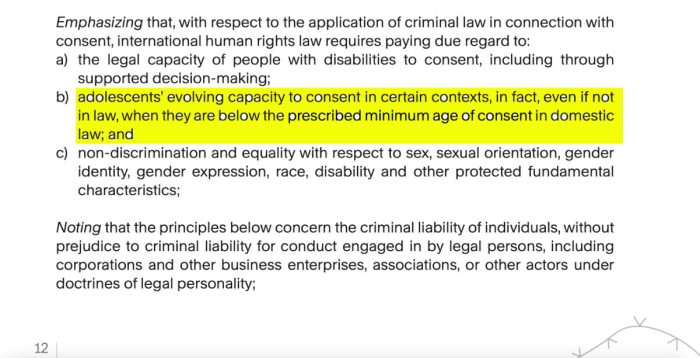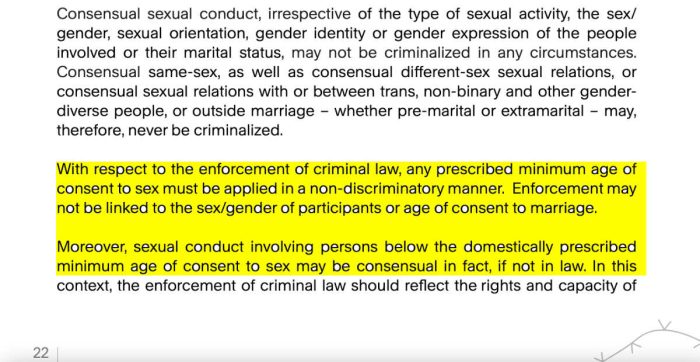The AP recently issued a fact check alleging that various outlets have misrepresented information presented in a recent report known as the 8 March Principles written by the International Commission of Jurists (ICJ), endorsed by members affiliated with the Joint United Nations Programme on HIV/AIDS (UNAIDS) and the United Nations Research Institute for Social Development, and launched on Wednesday, March 8 at a side event to the 52nd Session of the UN Human Rights Council.
Quoting a statement made by the ICJ on Thursday, the AP writes: “The 8 March Principles do not call for the decriminalization of sex with children, nor do they call for the abolition of a domestically prescribed minimum age of consent to sex.”
Also responding to media attention given to this report, the Spokesperson for the UN Secretary General stated at a press briefing (emphasis added):
I want to read something on behalf of our colleagues at the Joint United Nations Programme on HIV/AIDS (UNAIDS), because there has been a lot of — how to say — malicious misreporting on a recent report on the age of legal consent. And I can tell you that the report released by the International Commission of Jurists in March has recently been misrepresented on a number of websites. It did not call for the decriminalization of sex with children, nor did it call for the abolition of the age of consent. The International Commission of Jurists report set out legal principles to guide the application of the international human rights law to criminal law across a range of issues. In the application of law, it is recognized that criminal sanctions are not appropriate against adolescents of similar ages for consensual non-exploitative sexual activity.
Similarly, Christine Stegling, UNAIDS deputy executive director for policy, advocacy and knowledge, said in a statement to the AP: “In the application of law, it is recognized that criminal sanctions are not appropriate against adolescents of similar ages for consensual non-exploitative sexual activity.”
These comments are inadequate to assuage concerns surrounding this document.
“IN FACT, IF NOT IN LAW”
Nowhere in the report is any reference made to “consensual non-exploitative sexual activity” between “adolescents of similar ages.” Instead, the report makes reference to “adolescents’ capacity to consent in certain contexts, in fact, even if not in law, when they are below the prescribed minimum age of consent in domestic law,” and states, “sexual conduct involving persons below the domestically prescribed minimum age of consent to sex may be consensual in fact, if not in law.”

ICJ report, page 12

ICJ report, page 22 (under Principle 16)

ICJ report, page 23 (Principle 16 continued)
Nowhere in this document is the caveat that both parties should be of “similar ages” mentioned. The question of the age of the party engaged in “sexual conduct involving persons below the … minimum age of consent” is left unanswered. So, while the document may not explicitly call for the decriminalization of sex between adults and minors, that is certainly implied, or at least left open. The language regarding “consensual non-exploitative sexual activity” between “adolescents of similar ages” only appears in comments from various UN representatives made after the eruption of media furor over the document.
As noted by C-Fam:
The repeated use of the phrase “in fact, if not in law” is clearly intended to argue for laws prohibiting sex with minors to be enforced more leniently—if at all—in certain instances, where the argument could be made that the minor’s “evolving capacities” render him or her effectively, if not legally, able to give consent. These passages notably omit any mention of whether the sexual activity involving a person under the age of 18 involves a fellow minor or a person who might be significantly older.
And according to international lecturer and human dignity expert Wesley J Smith:
If national laws are changed in line with this recommendation, it would essentially gut statutory-rape laws because it can only mean that if the minor consented to whatever kind of sex was engaged, it should not be prosecuted if the minor is deemed sufficiently mature to have said yes. (It is worth noting that this same approach is being pushed in Canada to grant “mature minors” access to euthanasia without parental consent.)
MINORS CANNOT CONSENT TO SEX
Furthermore, the assertion that minors can, in fact, consent to sexual activity is not accurate. Mainstream science has repeatedly shown that children and adolescents do not have the cognitive and psychological capacity required to do so. According to Harvard Health Publishing:
[A]dolescents, compared to adults, find it more difficult to interrupt an action under way (stop speeding); to think before acting (learn how deep the water is before you dive); and even to choose between safer and riskier alternatives.… Adolescents’ judgment can be overwhelmed by the urge for new experiences, thrill-seeking, and sexual and aggressive impulses.… Evidence is appearing that these differences have a definite basis in brain structure and functioning. Recent research has shown that human brain circuitry is not mature until the early 20s[.]
Adolescents, in other words, lack both the life experience and cognitive development required to make healthy decisions about sex and to avoid engaging in activities whose consequences they are not yet ready for.
CONCLUSION
According to their own report:
[T]he International Commission of Jurists produced successive drafts of the principles and circulated them to a wide range of expert jurists, academics, legal practitioners, human rights defenders and various civil society organizations working in diverse legal traditions, for their review. Between 2020 and 2022, a series of in-person and on-line consultations took place, until this final version of the principles was finalized and circulated for endorsement in early 2023.
The document as written implies that the authors feel underage sexual activity should be legally accepted.
If this report was reviewed by attorneys, with successive drafts produced, why was there no inclusion of such language regarding “similar ages” in the document? Why was this language only mentioned by spokespersons after the press pointed out the glaring problems in the document itself? Perhaps if this was the true intent of the authors, they should issue an updated report or addendum making this point crystal clear.







